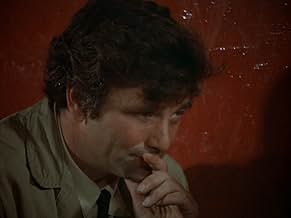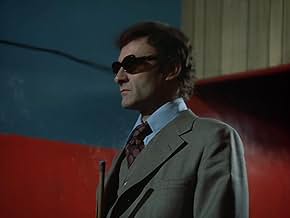A Friend in Deed
- Episode aired May 5, 1974
- TV-PG
- 1h 35m
A police commissioner provides a false alibi for a neighbor who killed his wife in a fit of rage. He then kills his own wife in cold blood and blackmails the neighbor into faking an alibi fo... Read allA police commissioner provides a false alibi for a neighbor who killed his wife in a fit of rage. He then kills his own wife in cold blood and blackmails the neighbor into faking an alibi for himself. Lt. Columbo has to untangle this mess.A police commissioner provides a false alibi for a neighbor who killed his wife in a fit of rage. He then kills his own wife in cold blood and blackmails the neighbor into faking an alibi for himself. Lt. Columbo has to untangle this mess.
- Director
- Writers
- Stars
- Salesgirl
- (as Arlene Martell)
- Director
- Writers
- All cast & crew
- Production, box office & more at IMDbPro
Featured reviews
As with many TV film series (such as Perry Mason), if you like one or two of them then you'll pretty much like them all. This entry in the Columbo series pretty much follows the usual formula we know the killer and the "perfect" plan but then watch Columbo follow his hunch and gradually starts to pick holes in the story he is told before eventually finding enough to prove his suspicions. Saying this is not a spoiler it is simply what happens in all the films. With this strict adherence to formula it is usually down to several factors whether or not the Columbo film stands out or if it is just average. Here the "deed" of the title is a murder and the friend involved in the "deed" is none other that the Deputy Police Commissioner Mark Halperin. This sets up quite a good story early on that only has a few weaknesses specifically the steps that Halperin takes later in the film, they seem unlikely, too impulsive and risky for such a powerful man. It might have worked if he had been written as arrogant or cocky but he isn't, he is smart and scheming. Once you get past these though the film is strong mainly because it gets the cat'n'mouse stuff spot on.
The attempts at comedy fall flat, nor do they manage to add to the character of Columbo the broken car and the desire for a cheap watch strap aren't funny and don't add anything to the story. However what director Gazzara does do well is frame a shot and he gives the series a gritty feel of the streets at times that was a fresh addition. More than that though, he gives the cast plenty of close ups and nobody takes more advantage of that than Falk himself. He is Columbo through and through but the close ups put him under pressure to show a lot in little things on his face, and he does it well. We can see his doubts, his thought process and even see it in his eyes as he sets and then springs the trap. It is a fine performance and it is these shots, rather than the broken cheap goods he owns, that tell us about the character. Kiley is a good match for him and plays his character well a worthy accomplice who doesn't play with Columbo but does think he has played the player. The film is at its best when the two men are on screen together. The support cast are less able; Murphy and McGuire are OK but they are never more than passable and I kept wanting them to step aside for the main event.
Overall this is an enjoyable Columbo film that is built on a typically strong story. The actors rise to this and produce some good interplay and director Gazzara helps them out a great deal by directing with an actor's eye, dishing out close-ups and clever shots that add to the performances. A strong film in the generally strong series.
This particular program, though, is the one I'd probably label my all-time favorite - among many, including those with the ubiquitous Columbo "killers," Jack Cassidy, George Hamilton, etc.
One of the greatest mistakes in the entire history of film was the casting of Peter O'Toole in the lead for "Man of La Mancha," rather than Richard Kiley, whose Broadway performance in this role was among the most acclaimed, ever. Kiley was an immensely- and diversely-talented actor, who should be more prominently recognized and remembered among his peers than he is.
His portrayal as the egotistic, manipulative, greedy deputy police commissioner, and the villain of this episode, is outstanding. The "shtick" of this series, of course, included the usually smooth, urbane, well-dressed, cosmopolitan qualities of the villains - contrasted markedly with Columbo's being the opposite in all of these.
This aspect is certainly apparent here - and the only somewhat puzzling part of the story is the seeming absence of Kiley's knowledge of Columbo's abilities beneath his sloppy exterior - and he would have certainly seen the records of the department certifying the lieutenant's significant abilities.
The main paradox in the history of "Columbo" was the ease with which he seemed to be able always to remain "under the radar," both within the department (even with those with whom he was most closely associated) and on the outside - despite having had to possess a better record for detection and solution of serious crimes than Sherlock Holmes, Hercule Poirot and Sam Spade - combined.
There is no way a review of a "Columbo" episode could be a spoiler. We know from the outset that Kiley is the villain here - however, Columbo's inevitable foiling his devious, wily superior, is perhaps the most clever in the history of this long series.
And Richard Kiley is the best Columbo villain of the third season. Donald Pleasence and Jackie Cooper also turned in emmy-quality performances that year, but Kiley brings a presence to the role that, physically, is intimidating. I don't think the Lt faced anyone quite this scary until they cast Rip Torn in the revival series in the '90's. He was the perfect choice for deputy police commissioner, in the way it makes you realize how a someone who seems to be so "in charge" can be evil penetrating the highest levels of order, and how he can pervert attempts to uncover it. The Lt's perplexity at Halperin's unwillingness to cooperate is one of the good bits on this. Big red flag, and you can see the Lt realizing it, in a turning point for the story.
This episode also has one of the best depictions of Columbo at work. As he wanders about the murder scene, it's like the camera's not even there--here's the bare intellect putting it together, and repeated viewings, when you know what he's thinking, are fun to watch.
Also, good job by Val Avery-- he was in a few other episodes, but Artie Jessup, a greasy little cat burglar just trying to make it on the outside, is his most memorable. Check out the way he tries to intimidate that fence, who isn't buying. Futility or what?
And catch Columbo's reaction when the husband hands him the major break, about the nightgown-- the case is cracked and he doesn't let on at all. Again, repeat viewing just makes it better.
Also I would be remiss not to mention the brief appearance by Arlene Martel as the jewelry saleslady. If I brought my crappy little watchband in, and she smiled at me like that while she turned me down, I'd consider myself blessed. By the way, Columbo picked up a bunch of people who had worked on Perry Mason-- Jackson Gillis was script editor on both shows, and some of the actors, such as Ms Martel, and the lovely and talented Jeanette Nolan, turned in memorable roles on both programs.
Finally, this episode covers the range of life in LA, from cozy clubs of the privileged to the seedy dives of the desperate. In fact, Columbo cracks it by having Halperin, a habitue of the former, be dragged into the latter.
One last comment-- I don't think Columbo did that well in seasons 2 and 3-- the episode with Julie Newmar and Martin Landau, for example, was in season 2-- the most depressing Columbo murder ever. And the cosmetics murder episode? If I had a chance to work with Vincent Price, I'd have made him the murderer if I'd had to rewrite the script from scratch. What. A. Waste. And that robot alibi in the one with Jose Ferrer-- even in 1972, they would have connected the computer with a cable, you wouldn't have had a ham-handed robot trying to type like a person. But they had Robbie the Robot available, so they had to write him and this Cute Kid into it. Completely unnecessary.
Peter Fischer (the author of this episode) came on board in season 4 as story editor, and frankly the improvement is noticeable. So, as a Columbo fan, looking at season 3-- I'm just glad they got Mr Kiley for this one, that Columbo had to fight someone within the department, and that his solution relies on the character's shortcomings like it does. Best of season 3.
The film's star is Richard Kiley, never well known in the UK but a TV personality in America. His villain is a frightening one with sociopathic tendencies and his placing at the top of the police command chain makes Columbo's life very difficult. Despite the lengthy running time, A FRIEND IN DEED is constantly engaging, with comedy that really works and some great clues building to a satisfying climax. Fans will be in their element with this one.
Did you know
- TriviaWhen Columbo is being paged over his car's police radio, for the first and only time, his call number is revealed; it is "194".
- Goofs(at around 41 mins) Mark Halperin (Richard Kiley) refers to the murder plot as a "Quid Quo Pro" instead of as a Quid Pro Quo.
- Quotes
Mark Halperin: [to his wife] Darling, if you're embarrassed by all your millions, why don't you just sign them over to me? They wouldn't embarrass me in the least.
- ConnectionsReferences Strangers on a Train (1951)
Details
- Release date
- Country of origin
- Language
- Also known as
- Meine Tote - Deine Tote
- Filming locations
- 355 S Muirfield Rd, Los Angeles, California, USA(Halperin residence)
- Production company
- See more company credits at IMDbPro

























